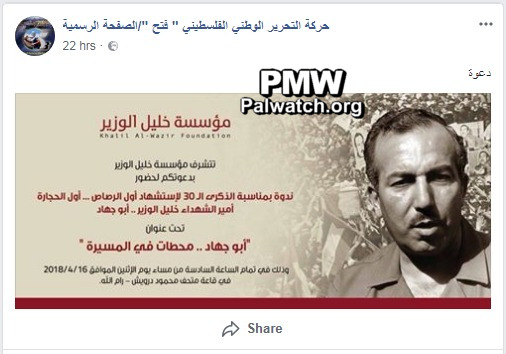Fatah posts invitation to conference for 30th anniversary of terrorist Abu Jihad’s death

Image and text posted on the official Facebook page of Fatah Movement
Posted text: “Invitation”
The image shows terrorist Khalil Al-Wazir “Abu Jihad,” who was responsible for the murder of 125 Israelis.
Text on image: “The Khalil Al-Wazir Foundation is honored to invite you to attend
A conference for the 30th anniversary of the death as a Martyr (Shahid) of the First Bullet and the First Stone (i.e., reference to terrorist Abu Jihad)
The Prince of Martyrs Khalil Al-Wazir ‘Abu Jihad’
Under the title
Abu Jihad – Stops Along the Way
At 6:00 p.m. on Monday, April 14, 2018
At the hall of the Mahmoud Darwish Museum in Ramallah”
Abu Jihad (Khalil Al-Wazir) - was a founder of Fatah and deputy to Yasser Arafat. He headed the PLO terror organization's military wing and also planned many deadly Fatah terror attacks in the 1960’s - 1980’s. These attacks, which murdered a total of 125 Israelis, included the most lethal in Israeli history - the hijacking of a bus and murder of 37 civilians, 12 of them children.
Khalil Al-Wazir Foundation - a foundation named after terrorist Khalil Al-Wazir Abu Jihad, who was responsible for the murder of 125 Israelis. The foundation's website is no longer accessible making its affiliation with official Palestinian institutions unknown. An article in the official PA news agency WAFA from April 18, 2013, at the time of the foundation's establishment, referenced it as an independent non-profit organization dedicated to preserving Al-Wazir's heritage.
Mahmoud Darwish is considered the Palestinian national poet. He published over 30 volumes of poetry and 8 books of prose and has won numerous awards. He joined the Israeli Communist Party in 1961 and the terrorist organization PLO in 1973, becoming a member of the PLO Executive Committee in 1987. He left the PLO in 1993 because it signed the Oslo Accords with Israel.
Many in Israel see his poetry as inciting hate and violence. One poem he wrote in 1988 at the height of the Palestinian wave of violence and terror against Israel (the first Intifada, 1987-1993) calls to Israelis: “Take your portion of our blood - and be gone… Live wherever you like, but do not live among us… Die wherever you like, but do not die among us… Leave our country, our land, our sea, our wheat, our salt, our wounds, everything, and leave the memories of memory.”
In 1964, he wrote a poem entitled "ID Card" in which he said: "I do not hate people, And I do not steal from anyone, But if I starve I will eat my oppressors' flesh; Beware, beware of my starving, And my rage."
He also wrote “Silence for the Sake of Gaza” in 1973, which many see as glorifying terror: “She wraps explosives around her waist and blows herself up. It is not a death, and not a suicide. It is Gaza's way of declaring she is worthy of life.”
His defenders have claimed that Israel misinterprets his poetry and that he sought reconciliation with Israel. One wrote in 2017: “Darwish arranged meetings between Palestinian and Israeli intellectuals, and published essays on their discussions. He was optimistic that, through mutual understanding, the two sides could eventually reconcile.” [https://www.bcalnoor.org/]